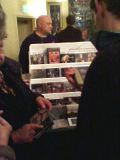 Riding to Berkeley in a BART train filled with drunken Santas certainly put me in a Christmas mood for Philharmonia Baroque's Messiah. The performance was without cuts & lasted for 3 hours, with one intermission after Part One. The chorus of only 24 had a clean, weightless sound & made it easy to understand the words. I enjoyed their pronunciation of "cast" with a flattened British A in "cast away their yokes from us." I especially liked their barbed "He trusted in God that he would deliver him," which imitated mocking laughter.
Riding to Berkeley in a BART train filled with drunken Santas certainly put me in a Christmas mood for Philharmonia Baroque's Messiah. The performance was without cuts & lasted for 3 hours, with one intermission after Part One. The chorus of only 24 had a clean, weightless sound & made it easy to understand the words. I enjoyed their pronunciation of "cast" with a flattened British A in "cast away their yokes from us." I especially liked their barbed "He trusted in God that he would deliver him," which imitated mocking laughter.The church acoustic suited tenor John McVeigh's clear, bright voice well. He even started to sound a bit operatic during the recitative "Unto which of the angels said he..." Bass Tyler Duncan has a solid, open sound with a slightly raw edge. He hit a nice low F at one point, & he was room-filling in "The trumpet shall sound." Countertenor Daniel Taylor interpolated a surprising high G in "He gave his back to the smiters." I liked Mary Wilson's warbling, warm & pleasant voice. Her spritely "Rejoice greatly" was a highlight of the evening. All of the singers were sparing in their use of ornamentation.
Conductor Nicholas McGegan is a cheery & impish presence on the podium. He does not feel that he has to conduct every beat, & he makes a variety of gestures, from waving his hand like a falling leaf to conducting with his knees. There were lots of small details of rhythm & articulation but almost no dynamic contrast, perhaps due to the Baroque instruments themselves. The valveless trumpet, for instance, did not seem able to differentiate piano & forte in "The trumpet shall sound." I was grateful for the timpani, which added much needed oomph to the Hallelujah Chorus & the final Amen.
The enthusiastic audience applauded loudly for the end of Part I, stood almost on cue for the Hallelujah Chorus & then stood again at the end, cheering & stamping their feet. During the intermission, my concert companion & I discussed the tradition of standing for the Hallelujah Chorus. The origin story does not quite make sense to me. An hour into the lengthy 2nd half of the program, he passed me a note which read, "George was just tired of sitting."
§ Philharmonia Baroque
Nicholas McGegan, conductor
Mary Wilson, soprano
Daniel Taylor, countertenor
John McVeigh, tenor
Tyler Duncan, bass
Philharmonia Baroque Chorale
Bruce Lamott, chorale director
HANDEL: Messiah
Sat, December 4, 7:30 pm Berkeley
6 comments:
Axel:
Ausgezeichnet!
Bruno
Vielen dank, Herr Blau.
There are three popular explanations for the custom of standing for the Hallelujah Chorus:
1. (the least likely—-George II not being noted for any musical taste) He was so thrilled by the majesty (hoho) of the Chorus that he leaped to his feet for a standing O (and when the King stands, all stand).
2. He thought/hoped that the Chorus, which ends Part 2, ended "Messiah," and he rose to leave.
3. He was fast asleep, and the sudden crash of drums and trumpets that mark the Chorus made him leap to his feet in alarm.
I think #2 sounds plausible. The piece is long & this chorus is clearly a climax.
But even if any of these are true, why would modern audiences, especially American ones who owe no allegiance to any English monarch, bother re-enacting the event? & do German audiences also stand, for instance?
At the performance at Herbst by these forces the evening before, only about a third of the audience stood at the beginning of the Hallelujah chorus--as the remaining two thirds looked bewilderingly around the hall for some sign of a fire alarm or terrorist threat: yet another reason for some members of an already elite audience to feel themselves even more superior--no doubt a sentiment that King George would appreciate!
David: Thanks for reporting on the the Herbst Theatre audience. I wonder how audiences will react for the up-coming SF Symphony performances, as well as the performances by the American Bach Soloists in Grace Cathedral. Perhaps attendees in a church setting are more likely to observe tradition.
One hopes that people do not stand in order to feel superior. My guess is that the Berkeley audience is just more experienced. There were 2 performances in Berkeley, so the Messiah is obviously well-attended by East Bay audiences.
Post a Comment